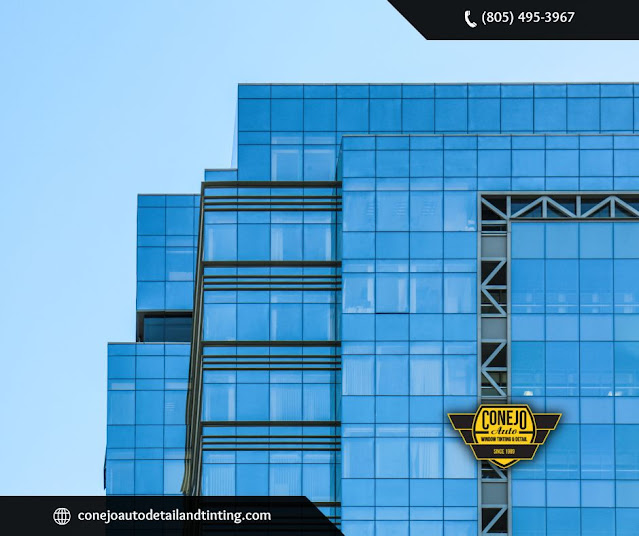The Role of Commercial Tinting in Enhancing Privacy Across Different Settings
Commercial tinting, which utilizes advanced film technologies, has become an essential tool for enhancing privacy across a wide range of industries. In corporate settings, these films act as a crucial defense against corporate espionage by obscuring sensitive information from outside view. Banks and other financial institutions use tinting to secure transaction areas, ensuring that confidential client interactions remain private. Similarly, healthcare facilities benefit from the added privacy that tinting provides, particularly in patient rooms and administrative offices, helping them adhere to HIPAA regulations. Retail environments employ tinting to shield high-value merchandise from prying eyes and reduce the risk of theft, while the hospitality industry uses these films to offer guests a higher level of privacy and comfort. The wide-ranging applications of commercial tinting underscore its critical role in providing effective privacy solutions in today’s business landscape.
Benefits of Commercial Tinting
One of the most immediate and significant benefits of commercial tinting is its ability to enhance privacy. In environments where sensitive operations or information are handled, such as corporate offices, healthcare settings, or financial institutions, privacy is of utmost importance. Tinted windows serve as a discreet yet highly effective barrier against unwanted attention, ensuring that security protocols are maintained.
For example, corporate offices use tinting to prevent competitors or outsiders from gaining visual access to confidential meetings or sensitive operations. This reduces the risk of corporate espionage by making it difficult for unauthorized individuals to observe the workplace from the outside. Reflective or dual-reflective films can be tailored to the specific privacy needs of a business, offering varying degrees of visibility control depending on the level of discretion required.
In addition to enhancing privacy, commercial tinting also improves security by discouraging unauthorized visual access to critical areas. This, in turn, creates a safer and more secure working environment, which can boost employee confidence and contribute to a more productive atmosphere.
Another major benefit of commercial tinting is its contribution to energy efficiency. Tinted films reduce solar heat gain and glare, which can lower air conditioning costs by reducing the strain on HVAC systems. This aligns with sustainable building practices and supports corporate social responsibility initiatives, making it a smart investment for businesses that want to reduce their environmental footprint while also improving operational efficiency.
In short, commercial tinting provides a strategic advantage by offering a combination of privacy, security, energy efficiency, and sustainability, making it an invaluable tool for any business.
Applications of Commercial Tinting
Commercial tinting is versatile and finds its application across a variety of industries, each benefiting from both privacy and enhanced functionality.
In corporate offices, tinting is often used on glass partitions and windows to maintain privacy during confidential meetings, ensuring that sensitive information is protected from external observation. Financial institutions like banks rely on commercial tinting to safeguard client transactions and ensure a secure atmosphere for both employees and clients.
In the healthcare industry, where patient confidentiality is critical, tinted windows provide an added layer of privacy in consultation rooms and patient wards. This not only helps institutions comply with HIPAA regulations but also contributes to a more comfortable and secure experience for patients and their families.
In retail environments, particularly in high-end stores, commercial tinting plays a key role in providing an exclusive shopping experience. It protects valuable merchandise from UV damage while offering customers a more private, comfortable atmosphere.
The hospitality industry also benefits significantly from the use of commercial tinting. Hotels often implement tinted glass to ensure guest privacy in rooms, offering them a higher level of seclusion and comfort. At the same time, this contributes to energy savings by reducing heat ingress, helping hotels manage their energy consumption more efficiently.
Educational institutions, too, find use for commercial tinting. It helps create focused learning environments by reducing distractions in classrooms and maintaining privacy in administrative offices.
The diverse applications of commercial tinting make it a critical tool for businesses looking to enhance privacy, security, and energy efficiency. From corporate offices and financial institutions to healthcare facilities, retail outlets, and hotels, commercial tinting provides a robust solution to safeguard sensitive information, improve comfort, and foster secure environments. By leveraging advanced film technologies, businesses can tailor their tinting solutions to meet specific needs, whether it’s protecting confidential data, ensuring patient privacy, or enhancing the shopping experience. In today’s privacy-conscious world, commercial tinting plays an indispensable role in maintaining security and discretion across various sectors, making it a vital asset in modern business operations.




Comentarios
Publicar un comentario